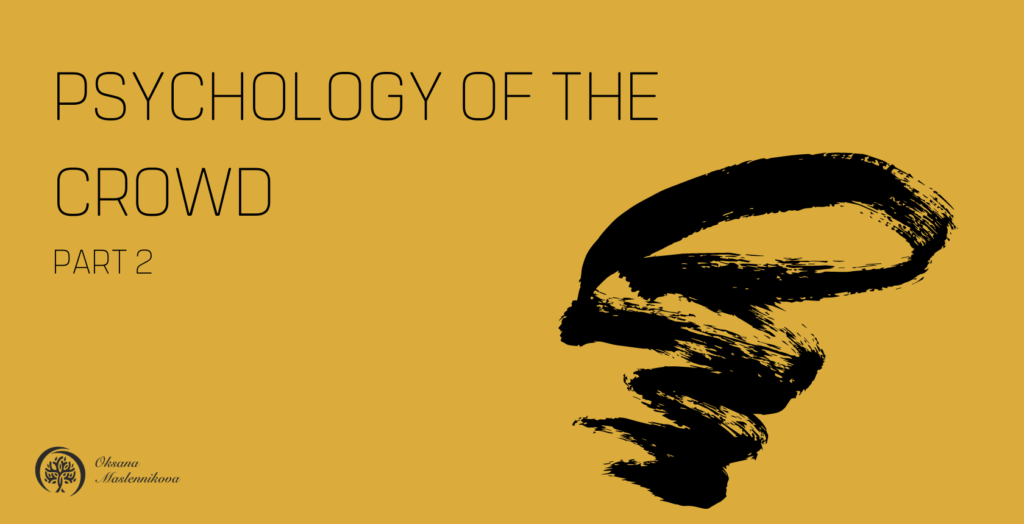Materials
The psychology of the crowd. Part 2
- 19.08.2020
- Posted by: Oksana Maslennikova
- Category: Psychology

Psychological properties of the crowd
Social psychologists note a number of psychological features of the crowd. They are inherent in the entire psychological structure of this education and are manifested in various areas:
- cognitive;
- emotional and strong-willed;
- temperamental;
- moral.
In the cognitive sphere, the crowd expresses various oddities of its psychology.
Incapacity for awareness. Important psychological characteristics of a crowd are their unconsciousness, instinctiveness, and impulsiveness. If even one person is rather weakly susceptible to the messages of reason, and therefore most of the actions in life are made by emotional, sometimes completely blind, impulses, then the human crowd lives exclusively by feeling, logic is repugnant to it. The unmanageable herd instinct comes into play, especially when the situation is extreme, when there is no leader and no one shouts restraining words of commands. The heterogeneous in each individual-a part of the crowd-is drowned in the homogeneous, and unconscious qualities take over. The General qualities of character, controlled by the unconscious, come together in a crowd. An isolated individual has the ability to suppress unconscious reflexes, while a crowd does not.
Features of the imagination. The crowd has a strong capacity for imagination. The crowd is very susceptible to impressions. Images that capture the imagination of the crowd are always simple and clear. The images evoked in the mind of the crowd by someone, the idea of an event or event, are almost equal in vividness to real images. It is not the facts themselves that strike the imagination of the crowd, but the way they are presented to it.
Another very important effect of the crowd is collective hallucinations. In the imagination of people gathered in a crowd, events are distorted.
Features of thinking. The crowd thinks in images, and the image it conjures up in its turn conjures up others that have no logical connection with the first. The crowd does not separate the subjective from the objective. She considers real images that are evoked in her mind and often have only a very remote connection with the fact she observes. A crowd that can think only in images is susceptible only to images.
The crowd does not reason or think. It accepts or rejects the whole idea. It does not tolerate any disputes or contradictions. The reasoning of the crowd is based on associations, but they are connected only by apparent analogy and consistency. The crowd can only accept ideas that are simplified to the limit. The judgments of the crowd are always imposed on it and are never the result of a comprehensive discussion.
The crowd never seeks the truth. She turns away from the evidence, which she does not like, and prefers to worship delusions and illusions, if only they tempt her.
For a crowd that is incapable of thinking or reasoning, there is nothing improbable, but the improbable is the most striking.
There is no premeditation in a crowd. She can consistently experience and go through the entire range of contradictory feelings, but will always be under the influence of the excitement of the moment. The Association of dissimilar ideas that have only an apparent relation to each other, and the immediate generalization of particular cases, are the characteristic features of the reasoning of the crowd. The crowd is constantly under the influence of illusions. Some important features of crowd thinking should be highlighted.
Flatness. Without any doubt as to what is true and what is wrong, the crowd expresses as much authority in its judgments as it does intolerance.
Suggestibility. The most dangerous and essential thing about crowd psychology is its susceptibility to suggestion.
Every opinion, idea, or belief suggested to the crowd, it accepts or rejects entirely, and treats them either as absolute truths or as absolute errors.
In all cases, the source of suggestion in the crowd is an illusion born in one individual through more or less vague memories. The evoked representation becomes the nucleus for further crystallization, filling the entire area of the mind and paralyzing all critical abilities.
It is very easy to inculcate in a crowd, for example, a sense of adoration that makes it find happiness in fanaticism, submission, and a willingness to sacrifice itself for its idol.
However neutral the crowd may be, it is still in a state of expectant attention, which facilitates all suggestion. The birth of legends, easily spread in the crowd, is due to its credulity. The same direction of feeling is determined by suggestion. As with all beings under the influence of suggestion, the idea that has taken possession of the mind tends to express itself in action. The impossible does not exist for the crowd.
The contagiousness. Psychological infection contributes to the formation of special properties in the crowd and determines their direction. Man is prone to imitation. Opinions and beliefs are spread to the crowd by infection.
The emotional-volitional sphere of the crowd is also characterized by numerous psychological features.
Emotionality. In a crowd, there is such a socio-psychological phenomenon as emotional resonance. The people involved in the excesses are not just neighbors. they infect others and become infected from them. The term “resonance” is applied to this phenomenon because the participants of the crowd during the exchange of emotional charges gradually inflame the General mood to such an extent that there is an emotional explosion, hardly controlled by consciousness. Certain psychological conditions of a person’s behavior in a crowd contribute to the onset of an emotional explosion.
High sensuality. The feelings and ideas of the individuals who form the whole called the crowd take the same direction. A collective soul is born, but it is temporary. The crowd knows only simple and extreme feelings.
The various impulses obeyed by the crowd may, according to the circumstances (namely, the nature of the excitement), be generous or evil, heroic or cowardly, but they are always so strong that no personal interest, not even a sense of self-preservation, can suppress them.
In a crowd, the exaggeration of a feeling is due to the fact that the feeling itself, spreading very rapidly through suggestion and infection, arouses universal approval, which contributes greatly to the increase of its power.
The strength of the crowd’s feelings is further increased by the lack of responsibility. The certainty of impunity (the greater the number of the crowd) and the consciousness of considerable (though temporary) power enable crowds of people to show such feelings and perform such actions that are simply unthinkable and impossible for an individual.
Whatever the feelings of the crowd, good or bad, their characteristic feature is one-sidedness. The one-sidedness and exaggeration of the feelings of the crowd leads to the fact that it knows neither doubt nor hesitation.
In its eternal struggle against reason, feeling has never been defeated.
Extremism. The forces of the crowd are directed only at destruction. The instincts of destructive ferocity lie dormant in the heart of almost every individual. It is dangerous for an isolated individual to give in to these instincts, but being in an irresponsible crowd, where he is guaranteed impunity, he can freely follow the dictates of his instincts. In a crowd, the slightest altercation or argument on the part of any speaker immediately provokes violent shouts and violent curses. The normal state of a crowd that runs into an obstacle is rage. The crowd never cares about his life during a disturbance.
The peculiarity of the crowd consists in the specifics of socio-psychological phenomena that determine the uniformity of behavior of its participants. The fact is that the crowd is created mainly on the basis of the opposition of this community to the object of discontent.
The crowd often makes a community exactly what is “against them”. This, of course, is not a blind hatred of everything that people do not identify with. Nevertheless, in a crowd, the juxtaposition of “we” and” they ” reaches a socially significant, often very dangerous value.
The crowd does not have a critical attitude to itself and there is “narcissism” – “we” are perfect, “they”are to blame for everything. “They” are cast in the image of the enemy. The crowd counts only with strength, and kindness does not affect it much; for the crowd, kindness is a form of weakness.
Motivation. Self-interest is very rarely a powerful engine in a crowd, while in an individual it comes first. Although all the desires of a crowd are very passionate, they do not last long, and the crowd is as little able to show a persistent will as it is to show judgment.
Irresponsibility. It often generates an incredible brutality of aggressive mobs, incited by demagogues and provocateurs. Irresponsibility allows the crowd to trample on the weak and worship the strong.
In the temperamental sphere, the psychological characteristics of the crowd are manifested in physical activity and diffusiveness.
Physical activity. The tendency to immediately turn suggested ideas into actions is a characteristic feature of the crowd.
Diffusion. The agents that act on the crowd that obeys them are very diverse — this explains its extreme variability. Above the well-established beliefs of the crowd lies a surface layer of opinions, ideas, and thoughts, constantly arising and disappearing. The opinion of the crowd is fickle.
The absence of clear goals, the absence or diffuseness of the structure generates the most important property of the crowd — its easy transformation from one species (or subspecies) to another. Such transformations often occur spontaneously. Knowledge of their typical patterns and mechanisms allows you to deliberately manipulate the behavior of the crowd for adventurous purposes or for the purpose of deliberately preventing its particularly dangerous actions.
In the moral sphere, the psychological characteristics of the crowd are most often found in morality and religiosity.
Morality. The crowd can sometimes demonstrate very high morals, very lofty manifestations: selflessness, loyalty, unselfishness, self-sacrifice, a sense of justice, etc.
Sign up for our newsletter to be among the first to know everything about our updates
What topics are you interested in?
Leave a Reply Cancel reply
You must be logged in to post a comment.
